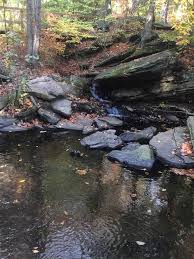Comment on stormwater permit
Fellow TU members,
Connecticut’s National Leadership Council representative Sal DeCarli, has drafted CTTU’s official response to the proposed changes to the DEEP Stormwater Permit. The stormwater permit is currently out for public comment, and DEEP is accepting comments on the entire permit (including new regulations for solar projects). Sal has drafted some fantastic language that specifically protects coldwater fisheries and watershed throughout Connecticut. Coldwater ecosystems are not given any special protections in the State, but this new language will go a long way in getting these habitats recognition and protection, if we can get the CTDEEP to include our new language stormwater permit.
We need as many letters of support for our proposed language as we can get! Please share the attached letter with your members, and have them submit the sample letter to DEEP, signed by them by Feb. 18.
You can submit a copy of the letter signed by you electronically and read more at https://www.ct.gov/deep/cwp/view.asp?A=2586&Q=610706 Letters can also be sent by USPS mail. It is crucial to sign and send on your own so as many letters as possible reach DEEP. Click here for a copy to print and mail.
The text is also pasted below.
Thank you for your time.
John Kovach
———
Christopher Stone, P.E.
Water Permitting and Enforcement Division
Bureau of Materials Management and Compliance Assurance
Department of Energy and Environmental Protection
79 Elm Street
Hartford, CT 06106 5127
Mr. Stone,
I am writing to you in support of Trout Unlimited’s (TU) proposed changes to the General Permit for the Discharge of Stormwater and Dewatering Wastewaters from Construction Activities. TU’s proposed changes will help protect sensitive coldwater ecosystems, including the wild brook trout and wild brown trout that rely on clean cold water for their survival. The addition the amendments that TU and I are in support of are:
Section 2. Definitions
“Coldwater Fish Resource (CFR)” means a waterbody (stream, river, or tributary thereto) with documented populations of wild brown trout (Salmo trutta) or wild brook trout (Salvelinus fontinalis) as documented by CT DEEP in the last ten (10) years.
Section 5. Conditions of This General Permit
(a)General Conditions
(4) Impacts to Coldwater Fish Resources (CFRs)
A one-hundred (100) foot buffer shall be maintained between any project and a CFR. The buffer shall consist of undisturbed soil and existing vegetation. Fisheries data is available online through the University of Connecticut (UCONN) Connecticut Environmental Conditions Online (CTECO) or by contacting CT DEEP Inland Fisheries.
(b) Stormwater Pollution Control Plan
(2) Stormwater Control Measures
(D) Other Controls
The one-hundred (100) foot buffer adjacent to any CFR must be maintained post-construction and supplemented with additional plantings as necessary to maintain the canopy/stream cove
CFRs are particularly sensitive to landscape modifications in riparian corridors. These include decreases in canopy cover and modifications to coldwater seeps and springs that maintain the coldwater CFR species require.
The one-hundred (100) foot buffer proposed in Appendix I is a commendable step forward in reducing the impacts of solar projects on wetland, watercourses, and vernal pools. However, the impacts of clearing and development are not limited to solar projects. All development has the potential to impact wetlands, watercourses, and vernal pools. CFRs are particularly sensitive to landscape modifications along riparian corridors and a single development site has the potential to irreversibly change a watercourse. These impacts to CFRs cannot not be mitigated/replicated elsewhere like a wetland or vernal pool. Once the thermal properties of a watercourse are changed (and the species extirpated), it cannot not be reversed.
I am in full support of the CT Council of Trout Unlimited’s proposed amendments which they have submitted to you and the Department. CFRs, and the species they support, are increasingly threatened by warming trends and precipitation fluctuations in the Connecticut climate, and require special protections. Thank you for your time.
Sincerely,
(Signature)
(Type Name)
